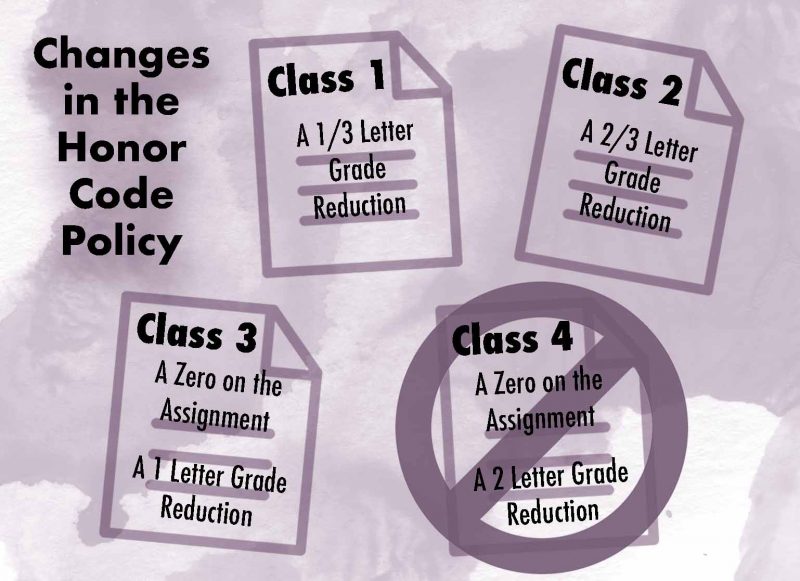The Academic Honor Council is considering an amendment to the Academic Honor Code that would reduce the severity of the most serious punishment for first offenses. The change would only go into effect if a faculty assembly votes to pass the amendment in mid-April.
Currently, the honor code has four classes of violations: Class 1 for minor violations, Class 2 for moderate violations, Class 3 for substantial violations and Class 4 for major violations. However, the council has proposed an amendment to combine the Class 3 and Class 4 sanctions, reducing the total number of sanctions to three.
Chad Spigel, faculty advisor of the Academic Honor Council, explained that this amendment was a result of changes in the council’s goals over the years.
“I think the Honor Code and the council have changed depending on the students who are on it, and one of the things that they’ve been trying to emphasize since I’ve been faculty advisor is the educational process,” Spigel said. “The students are very interested in the educational process and don’t want to make it so that a student can’t recover from their first honor code violation.”
The conditions under which Class 3 and Class 4 are invoked are very similar, which has resulted in uneven categorization for similar offenses over the years.
The guidelines for a Class 3 violation, according to the Honor Code, are that “the offending material in the assignment is either extensive or critical to the assignment as a whole, but the student has also contributed significant original material of his or her own.”
A Class 4 violation occurs when “the offending material in the assignment is either extensive or critical to the assignment as a whole, and the student made a minimal original contribution, if any, to the assignment.”
The original honor code was approved by the Association of Student Representatives, now called the Student Government Association, and the Faculty Senate on Feb. 21, 2003.
Spigel hopes that the amendment will make the decision-making process easier for students on the Council.
“I think it’ll make it a little more uniform in terms of decision because what I’ve seen is that students really struggle between 1 and 2 and between 3 and 4,” Spigel said. “They quantify. They try to give percentages, and you can’t really do that because it’s not black and white in terms of what’s cheating and what’s not cheating, and so it becomes very hard.”
Kristen Rundstein, senior and internal chair of the Academic Honor Council, agreed that reducing the number of sanctions may lead to a more equitable process.
“We feel like by changing to this three-count system we will have more fair hearings across the board,” Rundstein said.
One of the important changes is lessening the severity of the harshest sanction.
The protocol for Class 3 and 4 violations is the same under the current standards, with one major difference. Like with all violations, students must complete an online program that focuses on ethical principles. Students will get a zero on the assignment for both Class 3 and 4 violations, but students will receive a one-letter grade reduction for a Class 3 violation and a two-letter grade reduction for a Class 4 violation.
Under the new amendment, the harshest sanction will be a Class 3 violation — just a one-letter grade reduction.
Rundstein feels that this change aligns with the objectives of the current Honor Council.
“We decided that because we don’t want Honor Council to be punitive and we want it to be a learning experience, we should reduce the harshest sanction to a one-letter grade reduction as opposed to a two-letter grade reduction,” Rundstein said.
“I think anything that creates more consistency across the board on how sanctions are applied is good,” said Diane Smith, professor of geosciences.
Ten years ago, Smith was part of the five-year review of the Academic Honor Council, where a committee composed of faculty and students interviewed people who were involved in the Academic Honor Council process.
Students with questions can email Chad Spigel at [email protected].







